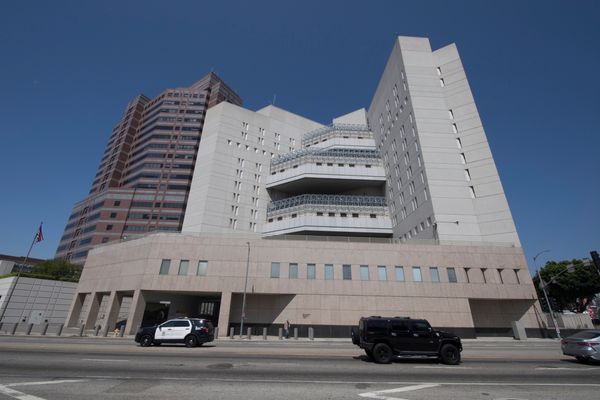
Zaporizhzhia (Ukraine) (AFP) - A UN convoy was to resume evacuations Friday of civilians still holed up inside a besieged Mariupol steelworks, the last pocket of Ukrainian resistance against Russian forces in the port city, but reports of renewed firing cast doubt on a promised truce.
About 200 civilians, including children, are estimated to still be trapped in the Soviet-era tunnels and bunkers beneath the sprawling Azovstal factory, along with a group of Ukrainian soldiers making their last stand.
Russia had earlier announced a daytime ceasefire at the plant for three days, starting Thursday.
But the Ukrainian army says Russian "assault operations" have continued by ground and by air.
Ukraine's Azov battalion, leading the defence at Azovstal, accused Russian forces of firing during an attempt to evacuate people by car.
"During the ceasefire at the Azovstal plant, a car was hit by Russians who used an anti-tank guided weapon," the battalion said on Telegram, saying the vehicle was "moving towards civilians to evacuate them" at the time.
The strike killed one Ukrainian fighter and wounded six others, it said.
Ten weeks into a war that has killed thousands, destroyed cities and uprooted more than 13 million people, defeating the resistance at Azovstal and taking full control of strategically located Mariupol would be a major win for Moscow.
May 9 fears
It would also be a symbolic success as May 9 approaches, the day Russia celebrates the Soviet victory over the Nazis in World War II.
Ukrainian officials believe Moscow is planning a May 9 military parade in Mariupol, possibly with Ukrainian prisoners on display.
The Kremlin Friday however denied plans for Victory Day celebrations in Mariupol, flattened by relentless Russian bombardment.
Moscow-backed separatists in southeastern Ukraine meanwhile said they had taken down traffic signs spelling out the name of Mariupol in Ukrainian and English, and replaced them with Russian ones.
Locals want to see proof that "Russia has come back here forever," said Denis Pushilin, head of Ukraine's breakaway region of Donetsk.
'Hell'
The United Nations had said Thursday a convoy was en route to help civilians escape the "bleak hell" of Azovstal, where food and water are running out and medical care is minimal.
The convoy was expected to arrive sometime Friday, in what would be the third joint evacuation operation with the Red Cross in Mariupol.
Almost 500 civilians were already evacuated from Mariupol and Azovstal in the previous UN-organised rescue missions in recent days, said the head of Ukraine's presidential office, Andriy Yermak.
He said renewed rescue efforts continued and that he would "give the results of this later".
During last weekend's rescues from Mariupol, civilians left in white buses, some taking three days to complete a 230-kilometre (140-mile) journey to Ukraine-controlled Zaporizhzhia, passing through multiple Russian checkpoints.
Azov battalion leader Andriy Biletsky wrote on Telegram Friday that the situation at the plant was critical.
"The shelling does not stop.Every minute of waiting is costing the lives of civilians, soldiers, and the wounded."
Speaking to the Israeli prime minister Thursday, Russian President Vladimir Putin said his army was "ready" to provide safe passage to civilians at Azovstal. But he said the last Ukrainian defenders had to surrender.
Staying 'forever'
Since failing to take Kyiv early on in the war, which began with Moscow's invasion on February 24, Russia has refocused its offensive on the south and east of Ukraine.
Taking full control of Mariupol would allow Moscow to create a land bridge between separatist, pro-Russian regions in the east and the Crimean peninsula, which it annexed in 2014.
Elsewhere, a Ukrainian official said Russian forces had almost encircled Severodonetsk, the easternmost city still held by Kyiv, and are trying to storm it.
Kherson in the south remains the only significant city Russia has managed to capture since the war began.
A senior official from the Russian parliament visiting Kherson Friday said Russia would remain in southern Ukraine "forever".
"There should be no doubt about this.There will be no return to the past," Andrey Turchak said.
Pentagon denial
The United States is among Ukraine's biggest backers, supplying military equipment and munitions worth billions of dollars as well as intelligence and training.
But the White House has sought to limit knowledge of the full extent of its assistance to avoid provoking Russia into a broader conflict beyond Ukraine.
The Pentagon on Friday denied reports that it helped Ukrainian forces sink the Russian warship Moskva in the Black Sea last month in a stunning setback for Moscow's invasion.
Pentagon spokesman John Kirby said the US had "no prior knowledge" of the plan to strike the ship, which sank April 13, leaving a still-unclear number of Russian sailors dead or missing.
Oil embargo row
Ukraine's government has estimated at least $600 billion will be needed to rebuild the country after the war.
Ukraine's Western allies have supported Kyiv with financial and military assistance, and have slapped unprecedented sanctions on Russia.
In what would its toughest move yet, the European Commission has proposed that all 27 EU members gradually ban Russian oil imports.
But Hungarian Prime Minister Viktor Orban, whose country is hugely reliant on Russian oil, said the ban would cross a "red line" for Budapest.
On the diplomatic front, Berlin announced that leaders of the G7 group of industrialised nations would hold video talks with Ukrainian President Volodymyr Zelensky Sunday.
Farmers on front line
The war is expected to have a deep impact on food crops in Ukraine, a country known as Europe's breadbasket.
Ukraine's wheat production is likely to be down by at least a third from last year due to Russia's invasion, according to data analysis firm Kayrros, using satellite imagery.
Some farmers are risking their lives to keep up with the spring planting season, finding themselves ploughing around unexploded ordnance.
"Every day since the start of the war we have been finding and destroying unexploded ammunition," Dmytro Polishchuk, one of the deminers, told AFP before heading into a field in the southwestern village of Grygorivka to destroy an unexploded rocket.
burs-mfp/raz







